The Reading Chair: Summer 2023
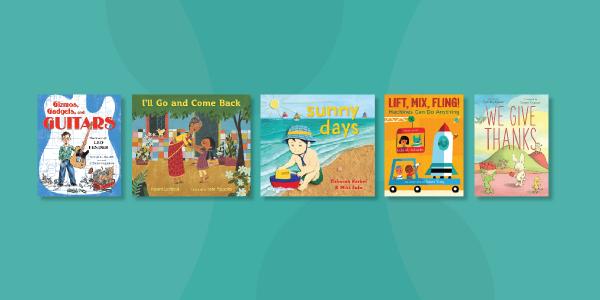
You are here
Children are naturally intrigued by ordinary, everyday situations and relationships. In this edition of The Reading Chair, we showcase books about finding joy in the nature, people, and objects around us. Early childhood educators can tap into children’s natural curiosities by embracing the everyday. Sunny Days can fold into beginning explorations of weather, seasons, or the sun and moon. Teachers can use Lift, Mix, Fling! Machines Can Do Anything or Gizmos, Gadgets, and Guitars: The Story of Leo Fender to inspire making and tinkering with everyday tools and machines. We Give Thanks and I’ll Go and Come Back can inspire discussions about relationships and parts of life that are important to us, individually and collectively.
– Isabel Baker and Miriam Baker Schiffer
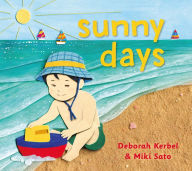 Sunny Days
Sunny Days
By Deborah Kerbel. Illus. by Miki Sato. 2022.
Toronto: Pajama Press. 24 pp. Ages birth to 3.
The sun is part of a child’s day from dawn until dusk. Through playful rhyme, Kerbel describes the sun as it appears throughout the day and in different settings. There’s waking to golden sun, glowing spring sun that shines down on newly planted seeds, blazing sun that brings out freckles, sun that glimmers on an ocean swim, and evening sun that casts long shadows. Sato’s cut paper illustrations are clear and colorful.
A list of suggested extension activities at the end of the book is quite inventive and would work well in an early learning setting. Activities include feeling the warmth of bricks and rocks on bright days, experimenting with shadows, and making sun-bleached artwork by putting objects on construction paper and placing them in the sun for a few hours. Young children will delight in these playful, science-infused activities, especially during outdoor time with others.
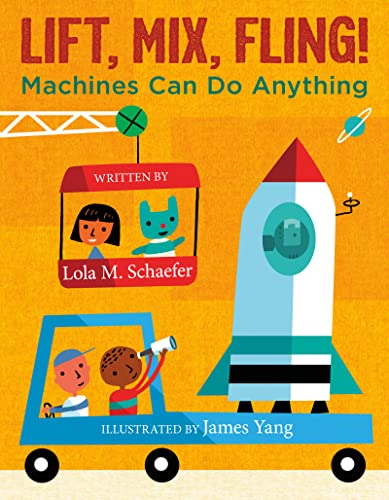 Lift, Mix, Fling! Machines Can Do Anything
Lift, Mix, Fling! Machines Can Do Anything
By Lola M. Schaefer. Illus. by James Yang. 2022.
New York: Greenwillow Books. 40 pp. Ages 1 to 6.
Calling all truck lovers, classroom tinkerers and makers, mathematicians, and eager learners! This book points out basic machines we use and see in everyday situations, particularly unexpected or overlooked ones, such as inclined planes and lenses. Young readers will enjoy taking in the whole book, with its bold and appealing illustrations, all at once. Older readers will be able to pore over the particular details on each page. Even adults may experience “aha” moments, such as realizing that a jar lid is a type of screw.
The book offers abundant connections to the classroom. For example, children can test how a wedge works in real life and make a wheel and axle combination. Teachers can use this book to begin a project or unit on machines, to introduce related terms (drawing on the definitions in the back of the book), and to inspire children to find and create their own simple machines.
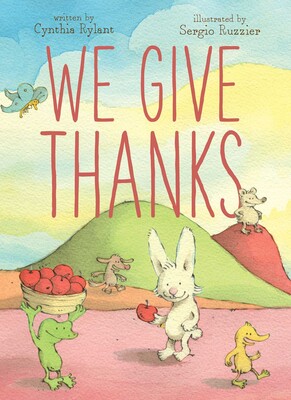 We Give Thanks
We Give Thanks
By Cynthia Rylant. Illus. by Sergio Ruzzier. 2021.
New York: Beach Lane Books. 32 pp. Ages 2 to 6.
This deceptively simple book of gratitude is lovely, thanks to Rylant’s deft writing and Ruzzier’s playful illustrations. The stars of the show are a bunch of animal characters—a dog, cat, bird, rabbit, frog, bear, and more—who express thanks for what they encounter during the day. A rabbit gives thanks for mittens and coats, and mice give thanks for steaming hot soup. Rylant also includes thanks for art projects, nature’s bounty, family, helpers in the community, the weather, and gathering together around the table. Ruzzier paints the characters with a sweet floppiness reminiscent of stuffed animals. He gives readers plenty of interactions to look at on each page.
This book can easily be integrated into conversations or projects about gratitude for everyday routines throughout the year.
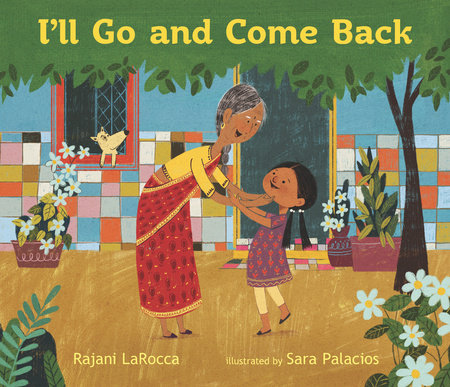 I’ll Go and Come Back
I’ll Go and Come Back
By Rajani LaRocca. Illus. by Sara Palacios. 2022.
Somerville, MA: Candlewick Press. 40 pp. Ages 3 to 8.
This warm story focuses on the growing bond between Jyoti, who lives in the US, and Sita Pati, her grandmother who lives in India, during their trips to visit each other. Being so far from home can make each one feel out of place and lonely. On her visit to India, Jyoti struggles with humid air, lots of mosquitos, and honking trucks. On her visit to the US, Sita Pati struggles with the blazing sun, the drone of the air conditioner, and silent suburban streets. But through their relationship, they come to find comfort in each other’s home. The culture of each location comes through in LaRocca’s carefully chosen dialogue and examples and in Palacios’s inviting illustrations. For instance, Jyoti and her grandmother create rangoli art in India and play hopscotch in the US.
The refrain to go and come back will be familiar and reassuring to those who journey, whether near or far, to stay connected to family.
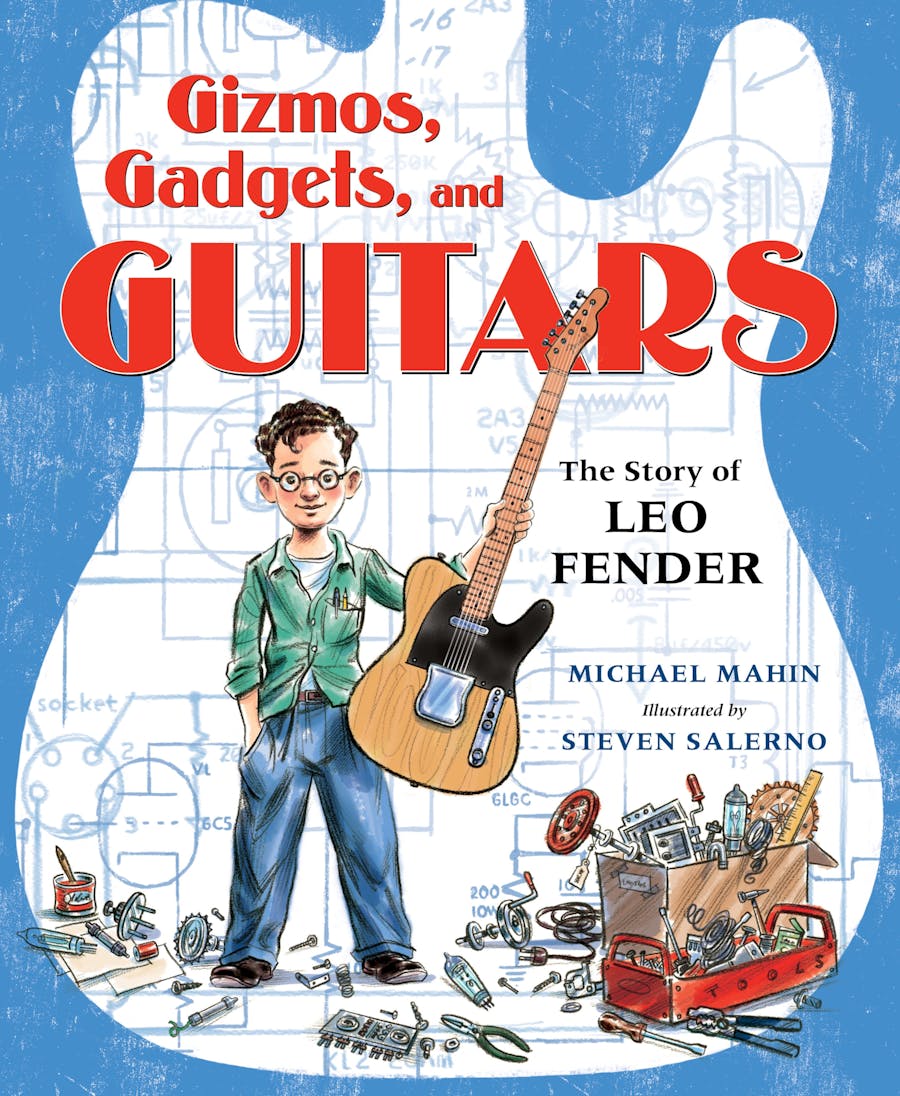 Gizmos, Gadgets, and Guitars: The Story of Leo Fender
Gizmos, Gadgets, and Guitars: The Story of Leo Fender
By Michael Mahin. Illus. by Steven Salerno. 2021.
New York: Christy Ottaviano Books. 40 pp. Ages 5 to 9.
Readers love an underdog story, and this one about the inventor of Fender guitars is just that. Leo Fender had some tough breaks as he grew up. He lost an eye in a farming accident at the age of 7. In young adulthood, he found his accounting degree to be useless because no one needed an accountant during the Great Depression. But just when things were looking bleak, his life-long love of tinkering started to pay off. New technology meant that musical electronics became more abundant and harder to repair, giving Fender plenty of work as an electronics repairman. But his tinkering brain wanted to do more than fix these pieces. He wanted to make them better in the first place. And that’s when the Fender electric guitar was born.
This is a feel-good story encompassing history, music, and technology. While the amount of text is suited for older readers, it is well-crafted and compelling. An author’s note and glossary provide additional details, and Salerno’s illustrations bring these decades to life. Teachers can explore with children themes of challenge, resilience, passion, and setting goals in the story and in their own lives.
Copyright © 2023 by the National Association for the Education of Young Children. See Permissions and Reprints online at NAEYC.org/resources/permissions.
Isabel Baker, MAT, MLS, is the founding director of The Book Vine for Children, a national company dedicated to getting good books into the hands of preschool children and their teachers. Isabel has worked as a children’s librarian and is currently a presenter on early literacy and book selection.
Miriam Baker Schiffer, MFA, is a writer in Brooklyn, New York. She consults on book selections for The Book Vine, in McHenry, Illinois. Miriam’s children’s book, Stella Brings the Family, was published by Chronicle Books in 2015.